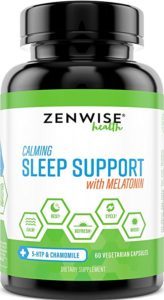Sleeping aids and supplements treat insomnia and come in a wide variety of forms with different chemical and metabolic mechanisms. They include but are not limited to melatonin supplements, valerian root, magnesium, lavender, sedating antihistamines, and hypnotics. Insomnia is an incredibly prevalent mental health issue, affecting about 25% of American each year, and is one of the earliest warning signs/precursors to serious neural diseases such as Alzheimer’s (1, 2).
Alcohol, nicotine, and drug usage are all possible causes, and lifestyle is a huge factor in insomnia, especially if it’s chronic (3).
Best Sleep Aids
1. VitaBalance Nature Sleep
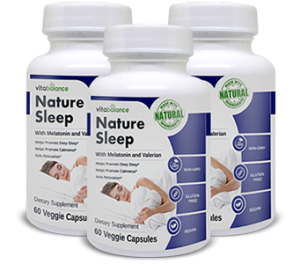
Nature Sleep uses a blend of Valerian root and melatonin, but also includes chamomile, magnesium, goji berry, and lemon balm which have been revealed through scientific studies to also aid in sleep. The combination of ingredients provides a deep sleep with ease and very few side effects.
When you consider the added benefits of an all-natural and gluten-free product, there are very few products that could match up to Vita Balance’s Sleep Aid product. For these reasons, it’s our #1 pick.
2. Performance Lab Sleep
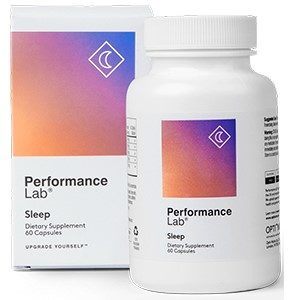
Performance Labs specifically uses Montmorency tart cherry as its melatonin choice instead of the traditional synthetic products. The natural choice of melatonin allows this product to effectively address the problem of next-day drowsiness quite well.
One of the most notable qualities found in this supplement is its suitability for vegans. While there are many sleep aids that tout an all-natural formulation, this is one of the few that could be considered vegan-friendly
3. Neuro Sleep+

As with many sleep aids, Nuzena’s sleep aid contains melatonin, magnesium, and valerian as the primary sleep-inducing agents. For its natural component, they have chosen to use ingredients such as 5-HTP, lemon balm, and l-tryptophan; all known to reduce anxiety and stress for calm and relaxation.
With additional natural ingredients such as ashwagandha, and a sugar-free, non-GMO focused product, Nuzena provides another solid supplement proven to be highly successful in assisting with sleep.
4. Lunar by Legion Athletics
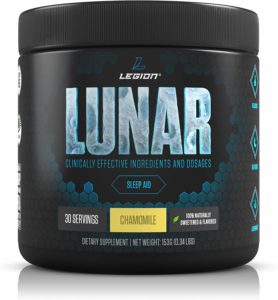
Providing the only sleep aid powder on our list, Legion Athletics provides a solid choice for athletes who may need relief following or workout, or those with an aversion to taking traditional capsules or pills. In addition to 500 mcg of melatonin, this supplement also includes lemon balm and rutaecarpin which have both been scientifically proven to be helpful sleep aids.
Of the many sleep aid products available, this supplement provides one of the largest numbers of servings and also offers great versatility. Those who may prefer to consume supplements via meals or smoothies will definitely find this to be a great choice.
5. Luna Sleep Aid by Nested Naturals
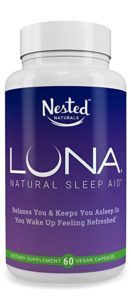
You’ll find 6 mg of melatonin in addition to proven sleep inducers such as valerian, chamomile, lemon balm, passionflower, and GABA in this clean sleep aid. Not only is this one of the simplest options on the market, but it is also highly rated by users and has been shown to be extremely successful.
Additionally, it is friendly for multiple lifestyles including those in need of a vegan or vegetarian option. Being one of the purest choices available speaks to its level of quality and makes it a strong contender for many people.
6. Zhou Driftoff Sleep Aid
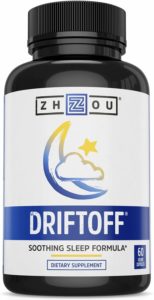
Zhou’s sleep aid option not only provides an affordable and accessible product, but also one that serves to address multiple sleep concerns. With 2 mg of melatonin, 150 mg of valerian root, and 100 mg of chamomile, those having trouble falling asleep or staying asleep will find this to be a useful product.
Additionally, its clean ingredient list and vegetarian-friendly capsules will serve as a great choice for a larger field of people who may be looking for help in this area.
7. Zenwise Health Sleep Support
While Zenwise Health uses the common ingredients that have come to be expected in a successful sleep aid, they have added neurotransmitter inhibitors such as GABA and 5-HTP.
The combination of melatonin and chamomile with these specific ingredients induces a more natural and easy sleep to eliminate the grogginess sometimes seen in sleep aid usage Though not as robust as other sleep aid options, this is still a product worthy of strong consideration
8. SennaBliss Sleep Sense
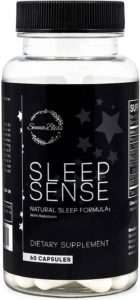
For those looking for a supplement that focuses more on communicating with your brain rather than other processes, SennaBliss’ sleep aid is just that. Unlike other sleep aids, this option uses a moderate dose of melatonin, while remaining heavy on neurotransmitter use. 5-HTP, GABA, and L-Theanine are the central focus in this supplement and are provided in highly substantial doses.
Though the sleep process may not be as sudden with this product, this may be a good choice for those who have not experienced success with other supplements.
9. Jarrow Formulas Sleep Optimizer
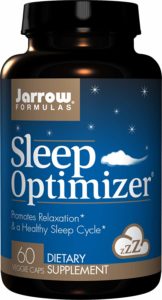
Jarrow’s sleep optimization formulation focuses on natural and neurotransmitter sleep-inducing ingredients.
While melatonin is present, it is extremely minimized in favor of others such as valerian root at 400 mg, L-Tryptophan at 300mg and GABA at 100 mg. Those who are looking specifically for a product that includes melatonin will need to look elsewhere, however, Jarrow Formulas provides a solid sleep aid choice
10. OLLY Sleep Melatonin
For those looking for a gummy option specifically, OLLY’s Sleep Melatonin is one of the few acceptable choices. While there is a minor 2 mg of added sugar, the overall formulation is solid. This product contains 3 mg of melatonin and provides natural relaxation-inducing ingredients such as lemon balm, chamomile, and passionflower.
Its all-natural flavors and colors derived from beet sugar, carrots, and blueberries makes this a unique product with a health-oriented focus.
How We Rank
Sleep aids often contain melatonin, valerian root, or diphenhydramine to induce restful sleep and produce any desired effects. While all 3 have a substantial track record of successful sleep, each affects the body differently. Melatonin and Valerian are both natural and have been shown to be successful with the least number of side effects
Diphenhydramine is more closely related to antihistamine-based medicines and could cause substantial side effects and as such, we eliminated supplements that focused heavily on this ingredient for sleep aid usage. Antihistamine based sleep aids have been shown to cause marked drowsiness and can often lead to possible issues with dementia. As a result, we eliminated any products, even popular ones like NyQuil, that used this as their source of sleep-induction.
We also evaluated products based on any supporting sleep-inducing properties. Ingredients such as chamomile, magnesium, and goji berry induce sleep and regulate sleep cycles due to their antioxidant qualities. Though it was not required for additional ingredients to be included, scientific evidence has shown that combining relaxation and calming ingredients such as these enhance the success rate of sleep aids in general. Products that took advantage of this, like Nested Naturals and Zhou Nutrition were given higher preference than those that avoided using them or used a minimal amount.
Additionally, products that contained neurotransmitters, like ZenWise and SennaBliss, were also placed higher on our list of products. Neurotransmitters connect with the brain directly and send signals promoting specific functions. In the case of sleep aid, neurotransmitters such as GABA and 5-HTP signal the brain to decrease activity and act as inhibitors. As a more natural action inducing ingredients, we sought to place products that either focused on these ingredients or combined the more common components of sleep-inducing supplements.
Finally, we placed a higher emphasis on products that contained all-natural products whenever possible. As with most supplements, those of higher quality are usually cleaner and purer in terms of ingredient lists. Having a simple formulation also tends to produce more potent effects and bring about a higher degree of success in terms of health-related goals. While products were still considered if their ingredient list was not wholly natural, a high degree of scrutiny was used to ensure the minimal presence of any unnecessary ingredients. This is why Vita Balance was our #1 pick.
Benefits
1. Sleep aids can improve the quality of your sleep, ensuring better rest in the same amount of time. A 2017 meta-analysis showed that melatonin, helped people fall asleep faster and more easily, while also more effectively regulating their sleep schedules (4).
A different 2017 review found that melatonin could assist in a wide variety of sleep disorders, including hypersomnolence (chronic daytime sleepiness) and breathing-related sleep issues. In comparison to widely available drug options, researchers found that melatonin offered a measure of the benefits with fewer side effects and less of a risk of dependency (5).
Moreover, according to a 2016 systematic review, valerian root can help people fall asleep and experience better sleep quality, without the risk of significant adverse side effects (6).
Several studies showed it improving subjective sleep latency, or the self-reported time it takes someone to fall asleep. Valerian has been shown to relax the central nervous system of mice by stopping the breakdown of gamma-aminobutyric acid in the brain.
2. Sleep aids can improve the duration of your sleep, helping you get enough per night. Sleep duration is important not only for physical health but also for mental well-being and happiness. Studies show that happiness can be correlated with the amount of time spent sleeping (to a certain degree of course) (7, 8).
Short sleep durations and common sleep disturbances can even be linked to cardiovascular disease.
This is especially important for people who suffer from significant hypersomnolence, or daytime sleepiness. Magnesium, for example, may be able to help women feel less sleepy during daytime hours, according to a 2018 study of magnesium as an insomnia treatment that took place in China (9).
It’s important to note that while natural sleep aids have been linked to better sleep, there’s also not as high a level of standardization among studies for them as there is for established, commercial hypnotic drugs (10).
The surest bet for a longer sleep duration is sedative antihistamines or prescribed sleeping pills.
3. Sleep aids can boost cardiovascular health. Valerian root, for instance, has a myriad of cardiovascular benefits, reducing lipid levels, lowering heart rate and improving blood pressure (11). It contains a number of amino acids and other essential oils. Melatonin may have slight benefits for people who suffer from Alzheimer’s or amyotrophic lateral sclerosis (12).
4. Sleep aids can help manage your weight and obesity. Evidence suggests that a lack of sleep makes dieting and other management techniques less effective, while also contributing to weight gain and obesity. While sleep is only one part of the picture (stress, lifestyle, and exercise all play equally important roles) taking sleep supplements can help you manage weight if it improves your sleep schedule and quality (13).
5. Magnesium can help you de-stress and relax your muscles, especially if you often find them tensing up at night. Besides being a potential sleep aid, magnesium is an electrolyte that helps regulate muscle contractions in the body (14).
A lack of proper magnesium can lead to cramps or muscle pain. Magnesium is used all throughout the body (even within your skeletal system) for a number of different physiological processes (15). A 2012 study showed that magnesium as a sleep supplement can help treat insomnia, but it can also lower cortisol levels and keep your body’s muscles looser and more relaxed (16).
Lower cortisol levels also mean less stress. Insomnia has been linked to stress and abnormal cortisol levels in a number of ways, with some studies suggesting that insomnia is a form of stress on your nervous system and others suggesting that your body’s stress-response system becomes more activated as a result of sleeplessness (17).
6. Sleep aids with antihistamines can also aid with allergy relief, which might further help cure insomnia. In fact, such medicines are primarily used to treat allergies, not sleeplessness. The drowsiness you may feel after taking a Benadryl is actually a side effect. However, at this point in time, there are antihistamines on the market which provide allergy relief without the sedating effects, making sedating antihistamines a good choice if insomnia is also a factor (18).
Allergy symptoms are one potential cause of insomnia. Asthma, frequent sneezing, nasal congestion, and trouble breathing can all make it significantly harder to fall asleep (19, 20).
7. Sleeping aids can help resolve issues associated with jet lag. Jet lag can turn into a major health issue if it starts seriously depriving you of the sleep your body needs to rest and reset. Studies show that the average recovery time can be as long as 4 to 6 days, with recovery time increases the more time zones that you pass (21).
This happens because your body’s internal clock, which runs on melatonin, gets disrupted. It normally measures the time and tells you to sleep based on the amount of light outside, but suddenly crossing time zones throws that entire process off.
Luckily, both melatonin and hypnotic sleep medications are effective treatments. Melatonin can improve subjective sleep ratings, meaning people who take it often say they feel more well-rested. Hypnotic sleeping medications improve both sleep duration and quality if taken around the appropriate bedtime (22).
8. Sleep aids can assist with shift work or other strange working hours. Research suggests that insomnia is a huge part of sleep difficulty that many shift workers experience (23).
If you work a night shift or have working hours that extend beyond the normal 9-to-5, insomnia may be affecting you. As such, using sleep aids or supplements can improve sleep and work performance at the same time, even in the face of an uneven work schedule.
9. Sleep aids can improve mental health. There’s some evidence to suggest that, for example, valerian root can be used to treat mild cases of anxiety as well as insomnia (24).
However, results aren’t completely standardized, and the effect of sleep supplements on mental health isn’t as well-researched as their sedative abilities.
What we do know, however, is that insomnia presents a significant mental health problem (25).
Lack of sleep has been linked to both anxiety and depression, especially among the elderly (26).
Supplements that treat insomnia thereby can also have a positive effect on individuals suffering from related mental health issues.
10. Valerian root is a sleep aid that may reduce the symptoms of premenstrual syndrome (PMS). According to one study of 100 women in Tel Aviv, valerian root caused a significant difference in symptoms of PMS such as dizziness and pain (27).
The authors concluded that it might help reduce the adverse physical, emotional and behavioral symptoms of PMS. More research is needed to completely establish valerian root as a standard PMS treatment, however.
11. Sleep aids could result in a stronger immune system. Sleep is one of the most critical and important functions within the human body. While getting a restful sleep has many obvious health benefits, it could also be useful in enhancing the body’s immune system. As a result, sleep aids that help to regulate and induce sleep consequently promote stronger immune systems in those that choose this supplementation option.
Studies conducted in 2012 explored the correlation between sleep deprivation and immune function. During these studies, sleep deprivation resulted in a decrease of cytokine proteins within the body. Cytokines not only help to promote sleep but assist in the fight against infection (28).
As a result of the lower immune function, chronic illnesses such as cold and flu are more likely to occur. The use of sleep aids to enhance routine sleep patterns serves to boost the cytokine production within the body and thus help in the prevention of general infection and diseases. Those that find themselves to be sick on a consistent basis, should consult their physician before beginning sleep aid consumption.
Side Effects
1. Taking sleep aids too frequently may result in dependency or abnormal circadian rhythm. Though sleeping pills aren’t particularly harmful drugs, developing a dependency on them is relatively easy if taken for long periods of time on a nightly basis (29).
It’s easy for your body to become completely accustomed to them, and stopping suddenly can result in withdrawal symptoms like irritability and headache. As such, hypnotics should only be taken when insomnia becomes a serious problem, and then only for short periods of time. Once symptoms get better, usage should be tapered off slowly so as to avoid withdrawal.
2. Hypnotic sleep aids may result in dizziness, amnesia, nausea, headaches, and confusion. Certain types of prescribed sleep aids may result in dizziness or more motor movement during sleep (30).
Others may cause amnesia or make it harder to do tasks that require focus and fine motor control, such as driving a car or operating machinery (31).
More powerful hypnotics may even produce a “hangover” effect similar to what you might feel after a night of heavy drinking. While they’re well-researched in short-term use, not as much is known about using hypnotics to manage long-term insomnia (32).
3. A few other side effects associated with heavy hypnotic use include sexual dysfunction and neuropsychiatric disorders like anxiety and suicidal tendencies (33). If you have mental health issues, you should make sure your doctor is aware before you ask for a hypnotic sleeping pill prescription.
4. Sleep aids may cause dry mouth. Though most sleep aids may not cause dry mouth, there are specific formulations that may cause chronic occurrences of this side effect. Diphenhydramine is most closely linked to antihistamine medications such as Benadryl. Though fast-acting to induce sleep, they may also cause chronic dry mouth.
Diphenhydramine based medications such as Benadryl block acetylcholine receptors and sodium channels within the human body. As a result, saliva production is also minimized thus causing dry mouth following consumption. (1) Though this can be controlled with fluid intake, users who consume these particular sleep aids long-term could experience difficulty in managing this condition.
Users that experience dry mouth should consider possibly switching to other options if the issue becomes chronic or uncomfortable. A trained physician should also be consulted if dry mouth becomes concerning.
Recommended Dosage
Because types of sleep supplements differ widely, the recommended dosage varies. For valerian root, for example, a few hundred milligrams (300-900mg) is a standard adult dosage, whereas somewhere between two-tenths of a milligram and five milligrams is appropriate for melatonin.
Generally speaking, one dose per day before bedtime is appropriate as long as symptoms last, though as previously stated, users should be careful not to develop a dependency on sleep aids.
FAQ
Is it safe to take more than one kind of sleep aid? This is a slightly complicated question. In some cases, yes. In other cases no. Users who are taking a hypnotic sleeping pill, for instance, probably shouldn’t supplement it with anything else. Such drugs are powerful enough to dramatically affect your sleeping habits on their own. Users who combine two different natural supplements, however, such as lavender and melatonin, may not have any issues.
One thing users should look out for is combining too many sedatives. An overdose of sedatives could cause trouble breathing and speaking, unconsciousness, and even death under extreme circumstances. No matter what the combination is, however, it’s always best to start slowly with one supplement, and then gradually add in another if you’re sure that you want to take two at the same time, monitoring closely for any unintended interactions or side effects.
Can I take sleep aids/supplements while taking other drugs? Generally, taking a sleep supplement (especially the natural kind, like lavender or valerian root) won’t come with any serious drug interactions. However, users taking prescription hypnotics or using sedating antihistamines should check with their doctor beforehand. Users who combine too many sedatives at the same time could suffer from unconsciousness or trouble breathing and speaking. The condition can even be life-threatening in extreme cases.
Should I take sleep supplements every night? For short periods of time, and during times of chronic and unmitigated insomnia, taking a supplement every day is okay. However, users should probably stray away from using a sleep aid every single night, especially if they can fall asleep without it. Overuse of sleep supplements or medications can disrupt your body’s normal sleep cycle and make it hard for you to fall asleep naturally, which is exactly why you started taking them in the first place.
When is the best time to take a sleep supplement? The best time to take a sleep supplement depends on your use case. If you’re taking them to solve general insomnia during the nighttime, the best time to administer supplements is 30 minutes before bed or seven hours before your standard wake-up time. On the other hand, if you’re trying to solve jet lag, you should take supplements slightly ahead (around 30 minutes) of the time you want to fall asleep, even if you’re not tired yet.
What is the best sleep supplement for me? When choosing a sleep supplement, it’s useful to think about the root cause of your insomnia. If it’s caused by allergies, then sedative antihistamines are a sure bet. On the other hand, if you’re suffering from jet lag, then melatonin and prescribed hypnotics are the two most well-established treatment methods.
Are natural or drug/synthetic sleep aids better? Natural sleep supplements like valerian root often come with fewer side effects, but they may not be as efficacious as synthetic pills. Melatonin, for instance, doesn’t come with the addiction and dependency risks that commercial sleeping drugs do, but it can also be used to treat sleep disorders and regulate your body’s circadian rhythm. In some ways, natural sleep supplements are actually preferred to stronger, conventional alternatives because there’s a much lower risk of addiction and abuse.
If you only suffer from mild insomnia, taking melatonin or supplementing with lavender or valerian root may be enough to help you overcome your symptoms. However, if you try doing so and do not experience any relief, sedating antihistamines and prescribed drugs are likely to offer a slightly stronger effect.
Can I get hypnotic sleeping medication over the counter? No. While you can get antihistamines with sedating ingredients (like the diphenhydramine in Benadryl) over the counter, hypnotics like zolpidem and zaleplon are available only through a doctor’s prescription. They’re stronger and come with more side effects and potential complications, so acquiring them is a bit more difficult.
Does my body make melatonin naturally? Yes, melatonin is a naturally-produced hormone released by the pineal gland. However, in some people it may be released at abnormal levels or at strange times, resulting in daytime sleepiness, an unusual sleep schedule, or insomnia. As such, supplements can be used to treat related sleep disorders by giving the body melatonin at the appropriate time.
Can sleep aids cause heart health issues? While sleep aids could help some cardiovascular function, it may also prove to be detrimental for those with previous heart failure. Those with a history of heart-failure were 8 times more likely to experience hospital readmission or suffer from cardiovascular-related death. With this being the case, users with a history of heart failure should consult their physician before consuming sleep aids. If signs or symptoms of cardiac distress are experienced following the use of a sleep aid, it is highly recommended that medical assistance be sought immediately.
Should sleep aids be used for children? In general, sleep aid supplements are not considered to be safe for children and should be used for this purpose unless directed to do so by a trained physician. Overall, melatonin may be offered to children for short periods to enhance sleep, however, it is generally recommended that other avenues such as diet and natural options be explored prior to beginning supplementation
Are there foods that can help with restful sleep? Yes, some foods can provide melatonin when needed. While supplementation has become popular when trying to achieve restful sleep, there are many foods that can induce sleep and enhance melatonin production. In general, grains such as rice and barley, fruits such as cherries, and grapes, and nuts such as walnuts and peanuts have the ability to help in the production of sleep.
Food can also be used to increase the intake of vitamins shown to have a positive effect on sleep directly. These can include foods high in calcium, magnesium or vitamin B6. While food can be used to enhance sleep, partnering with a physician can produce the best combination of food consumption and sleep aid use.
Can sleep aids cause appetite changes? Yes, sleep aids may cause appetite changes depending on the individual. In general, sleep deprivation could cause a loss of appetite. When sleep-deprived, leptin levels within the blood drop and hormone levels of ghrelin increase. As both of these factors interact, signals are consequently sent to the brain causing feelings of fullness. Once consistent and restful sleep has been achieved, these levels begin to work more accurately thus conveying correct messages to the brain.
Can sleep aids cause daytime drowsiness? Yes, some sleep aids may cause daytime drowsiness. Sleep aids generally use specific ingredients to induce sleep. While melatonin is considered to be one of the most popular options, those that use Diphenhydramine could cause unexpected results.
Can sleep aids cause hallucinations? Yes, in rare instances users of certain sleep aids may experience visual hallucinations or possibly sleepwalking. This is most commonly seen in users opting to obtain sleep assistance through the use of hypnotic sleep aids. These particular drugs depress or slow down the body’s functions. Though the primary goal is to produce sleep or a calming effect, specific body chemistry may instead produce hallucinations or sleepwalking episodes. Drugs most often associated with this behavior are Ambien, Lunesta, and Sonata, however, others may produce similar effects. If users experience any of these symptoms while using a hypnotic sleep aid, it is highly recommended that usage be discontinued immediately, and a trained physician should be consulted.
Can pregnant women take sleep aids? Sleep deprivation during pregnancy is considered to be a normal occurrence, however, the use of sleep aids will commonly vary from person to person depending on multiple factors. While there are a wide variety of sleep aids available, pregnant women are cautioned against using those that contain questionable ingredients or those that have not been proven to be safe. Other medications should not be considered without the guidance of a trained physician.
Recap
In short, various sleep aids and supplements like melatonin, sedating antihistamines, valerian root and lavender can help you sleep, but they come with many other benefits as well, such as ameliorating the effects of jet lag, offering allergy relief and even relaxing your mind and muscles.
The right supplement for you depends upon your particular cause of insomnia, as well as any other medical conditions or medications you may be dealing with, but that shouldn’t be an issue — a wide variety is available, both over the counter and as prescribed.
For Healthtrends #1 recommended sleep aid, click here.

